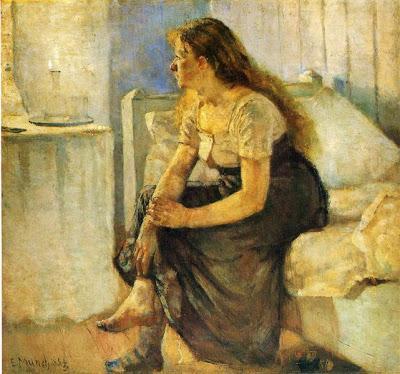
Morning by Edvard Munch
When I first started this blog with Baxter and Brad over five years ago, I made a commitment to our readers and myself that, except for weeks when were on vacation, there would be a post five days a week. But you know what? Even though I have lots of amazing help on the blog, both from regular contributors like Ram and Beth as well as from guest contributors, such as Ramona Pittman in her post Healing from Injury with Yoga just this week, some mornings I wake up and I’ve got nothing. There are no new articles by someone else in the pipeline that I can finish off, there’s no new scientific studies that I’ve just learned about that I can share with you, and there’s nothing new on my mind that I feel compelled to write about. On mornings like these (yes, today), I decide not to worry and just sit down at my desk and work on other things for a while. I tell myself, maybe something will just come up. And to keep myself from stressing out about it—and how long it might take me to finally come up with something—and, oh, no, what if I never come up with anything at all—I follow my own advice and think of the Bhagavad Gita:The wise man lets go of all
results, whether good or bad,
and is focused on the action alone.
Yoga is skill in actions.
So even though I mentioned this philosophy in my post Putting the Wisdom of Yoga into Action eally, today I wanted to emphasize that every day and in every way, the philosophy of the Bhagavad Gita (see Acceptance, Active Engagement, and the Bhagavad Gita) is so helpful to me in allowing me to literally do my work—whether it’s writing a book or practicing yoga or trying to help one of my adult children with a serious problem or fundraising for someone who desperately needs money—while staying grounded. I tell myself, “Just do the work.” So today I thought I’d just take a moment to praise this powerful yogic philosophy to any of you who haven't tried working with it yet and to remind those of you who do know about it about how useful it is, from the most mundane of situations like getting up in the morning and not knowing where your next post is coming from to the most significant ones like raising a child, working for social justice, or helping a loved one who is dying.
For more on this topic, see Yoga for Healthy Aging: Our Philosophy and Our Tools.
Subscribe to Yoga for Healthy Aging by Email ° Follow Yoga for Healthy Aging on Facebook ° Join this site with Google Friend Connect

